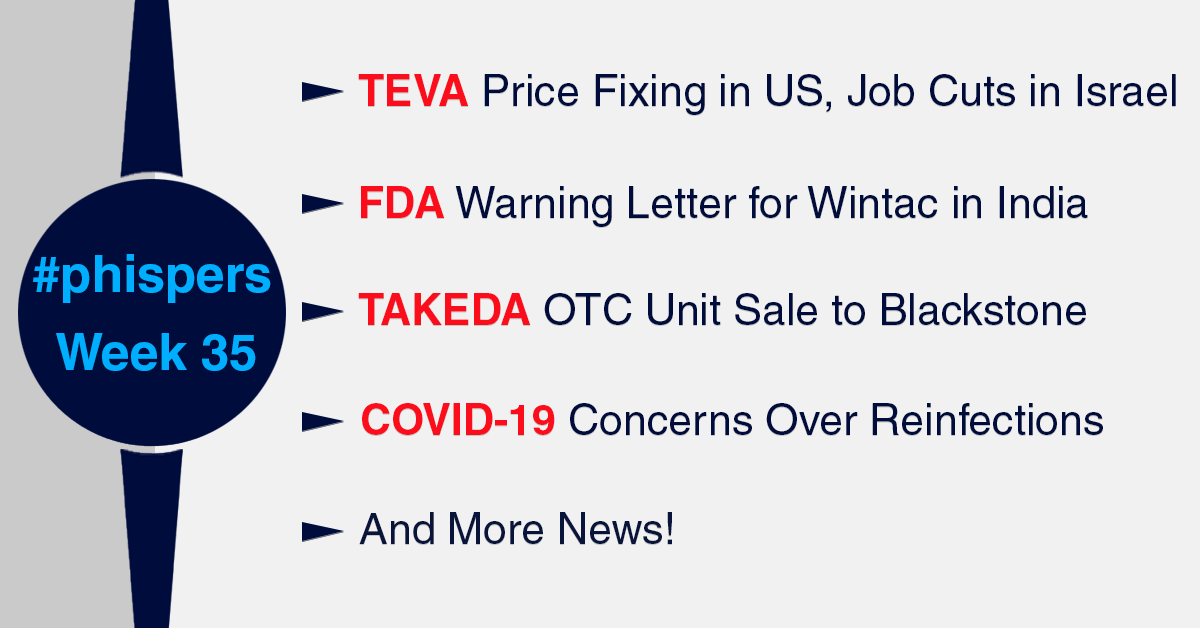
By PharmaCompass
2020-08-27
Impressions: 51249
This week, Phispers brings you more updates on Japanese drugmaker Takeda and Israeli drug giant Teva.
While Takeda sold its consumer healthcare business to Blackstone to reduce the debt it had incurred from buying Shire last year, Teva decided to cut 350 more jobs in Israel.
It also faced another generic drug price fixing charge in the US, this time by the Department of Justice.
As the world moves closer to inventing a vaccine for the novel coronavirus, we are seeing more deals in the logistics space.
Blackstone decided to put in US$ 275 million to fund Cryoport’s buyout of MVE Biological Solutions, a company that makes vacuum insulated products and cryogenic freezer systems for the life sciences industry.
The US Food and Drug Administration issued a warning letter to Wintac Limited, a specialty drug company that develops and markets sterile injectable and ophthalmic drugs.
And with cases of Covid-19 reinfections being reported from across the world, concerns are being raised over people’s immunity to the novel coronavirus.
Teva faces drug price fixing charges by DOJ in US; to cut 350 jobs in Israel
Just last week, we had reported on Israeli generic drug giant Teva being sued by the US government which accused it of submitting false claims to Medicare by using kickbacks to boost sales of its multiple sclerosis drug —Copaxone.
This week, there is news that the US Justice Department (DOJ) has become the latest prosecutor to accuse Teva of malfeasance, charging the company with raising the prices of generic drugs through a collusion with its competitors.
Teva is charged with three counts of conspiring with companies that include Glenmark Pharmaceuticals, Apotex Corp, Taro Pharmaceutical Industries and Sandoz Inc. According to the first charge, Teva, Glenmark and Apotex agreed to increase prices for the cholesterol-lowering drug, pravastatin, and other generic drugs. In the second charge, Teva and Taro are accused of agreeing to increase prices, rig bids and allocate customers for drugs to treat arthritis, seizures, pain, skin conditions and blood clots.
In the third charge, Teva and Sandoz are accused of a conspiracy involving drugs used to treat brain cancer, cystic fibrosis, arthritis and hypertension.
Teva said in a statement “it firmly rejects the allegations and will vigorously defend the Company in court.”
Teva to cut 350 manufacturing jobs: The Israeli firm may have officially ended its US$ 3 billion restructuring effort in late-2019, but its plans to downsize continue unabated. Teva is doing away with 350 more manufacturing jobs in Israel.
The job cuts will be made at Teva’s active pharmaceuticals ingredient (API) plant in Neot-Havav as part of a “global optimization plan” to streamline site operations through February 2022, the drugmaker said this week.
However, those job cuts won’t be immediate. Instead, the company has agreed to eliminate those positions at the 2022 cut-off date. Teva pledged in a statement to offer “fair separation benefits, beyond those required by the law or collective agreements” to its employees.
As part of that effort, which was launched in late 2017, Teva also shut down, sold or earmarked for disposal 23 manufacturing sites and shuttered 40 offices and laboratories.
As Covid-19 vaccines get closer to market, deal making starts in logistics space
Vials aren’t the only segment that is going to experience a surge in demand once the world sees Covid-19 vaccines in the market. Logistics is another area that will experience a sudden upswing.
And private equity firms are looking to encash on this opportunity. Logistics company MVE Biological Solutions is being acquired by Cryoport Inc for US$ 320 million. And private equity firm Blackstone Tactical Opportunities is putting in US$ 275 million to fund Cryoport’s ambition to seize an even larger portion of the cell and gene therapy supply chain, a business that is forecast to grow by 30 to 40 percent each year.
While Cryoport is a global leader in temperature-controlled supply chain solutions for the life sciences industry, MVE Biological Solutions is a global leader in manufactured vacuum insulated products and cryogenic freezer systems for the life sciences industry.
Vaccine supply chains are complex. A vaccine that eventually comes to market will likely need to be stored at 2 to 8 degrees Celsius throughout the shipping process. Some newer technologies, such as cellular and genetic therapies, require deep-frozen storage at -80°C or even -180°C (requiring liquid nitrogen). Transportation of vaccines that are based on the messenger RNA technology (being used by Moderna and Pfizer) would require such deep freeze technology.
Take the case of Translate Bio Inc, a small biotech based outside Boston which tied up with French drug giant Sanofi to develop an mRNA vaccine. The experimental vaccine comes with one significant drawback — it must be stored at -80°C. Therefore, the prevalence of deep freeze transportation technologies will help such vaccines.
According to a recent Bloomberg report, UPS is building “freezer farms” in Venlo, Netherlands and Louisville, Kentucky (both near UPS air hubs) featuring banks of -80°C freezers. The farms will contain a total of 600 freezers that can each hold 48,000 vials of vaccine. Additional freezer capacity will be installed in South America, Germany and the UK.
Similarly, DHL Global Forwarding, the air and ocean arm of DHL, has just opened a 20,000 square feet facility in Indianapolis, dedicated to life sciences and healthcare logistics. The facility has temperature-controlled storage at 15-25, 2-8 and -20°C temperatures, and is within a Free Trade Zone, allowing for international cross-shipping.
In fact, cold chain innovation is being carried out at a feverish pace. For instance, DHL and Accenture are working on a blockchain project which tracks pharmaceuticals from the point of origin to the consumer, to prevent tampering and errors.
FDA issues warning letter to Wintac’s India unit
The US Food and Drug Administration (FDA) has issued a warning letter to Wintac Limited, a specialty drug company that develops and markets sterile injectable and ophthalmic drugs.
The warning letter was issued to Veerappan Subramanian, President and CEO of Wintac Limited who is based in New Jersey. It lists out violations of current good manufacturing practice (CGMP) regulations found during an inspection of Wintac’s Bengaluru manufacturing facility in India from February 10 to 19, 2020.
During the inspection, FDA investigators found that Wintac’s investigation into contaminated media fill units was inadequate and lacked corrective actions and preventive actions (CAPA). The contaminated media fill unit investigations were found to lack scientifically supported conclusions, CAPA, and also failed to address all potentially compromised lots which could have been impacted by the contaminated media fill.
“It is essential that your investigations identify areas for improvement even when only possible root causes are identified. Without such risk mitigation, there is no assurance that you can prevent recurrence of failures from the same sources of excessive variation that led to the original failure,” the letter said.
The letter states that similar deficiencies were observed in June 2019, when the company did not thoroughly investigate into another failing media fill used to qualify the company’s new aseptic filling line.
In addition, smoke studies performed at Wintac’s aseptic processing operation were found to be inadequate and multiple aspects of both the cleanroom and aseptic processing line design had fundamental contamination risks.
“Until you correct all violations completely and we confirm your compliance with CGMP, FDA may withhold approval of any new drug applications or supplements listing your firm as a drug manufacturer,” the letter said. Failure to correct these violations may result in FDA refusing admission of articles manufactured at the Bengaluru unit into the US, it added, and also recommended that Wintac use the services of a cGMP consultant.
Back in April 2018, Endo had announced that it had reached definitive agreements to acquire Somerset Therapeutics and its India based affiliate Wintac. However, a year later, in February 2019, Endo announced that its subsidiaries — Endo Ventures Limited, Par Pharmaceutical, Inc and Par Formulations Private Limited — had terminated their agreements to acquire Somerset Therapeutics.
At the time, Endo’s President and Chief Executive Officer, Paul Campanelli, had said: “Endo has worked diligently to consummate this transaction since executing definitive agreements in April 2018; however, certain regulatory approvals in India have taken longer than anticipated and we do not have clarity as to when those approvals may be received.”
Takeda sells OTC unit to Blackstone; ties up with London-based biotech Engitix
Japanese drugmaker, Takeda Pharmaceutical, is selling its wholly-owned consumer healthcare business — Takeda Consumer Healthcare Company Limited — to US buyout fund Blackstone Group.
With this divestiture, Takeda aims to focus on developing drugs for unmet medical needs and rare diseases. The sale also aligns its portfolio to its global long-term growth strategy, and reduces its debt incurred due to the US$ 59 billion acquisition of Shire Plc last year.
Takeda’s CEO, Christophe Weber, said during an online briefing that the company had decided to sell the OTC unit as it would be difficult for Takeda to keep investing in its OTC businesses while trying to develop new drugs for more serious diseases.
Takeda Consumer Healthcare Company, which is known for its Alinamin line of energy drinks, is valued at US$ 2.29 billion (242 billion yen). However, the sale price will be determined after calculating its debt and other factors, the company said.
Proceeds from the sale of this business would boost Takeda’s net profit by US$ 990 million (105 billion yen). The transaction is expected to close by March 31, subject to regulatory closing conditions, it said.
Takeda also signed a collaboration with London-based biotech Engitix to develop drugs for advanced fibrotic liver diseases, including NASH. Though the upfront payments have not been revealed as yet, Engitix will be eligible for up to US$ 500 million in milestones.
News of Covid-19 reinfections raises concerns world-over
News about two European patients having been re-infected with Covid-19 has raised concerns about people’s immunity to the novel coronavirus, even as drug companies across the world desperately look for vaccines and treatments to control the pandemic.
News about two patients in Belgium and the Netherlands comes a day after similar news from Hong Kong was reported, where a man was learnt to have contracted a different strain of the virus four and a half months after being declared that he had recovered from the infection.
The 33-year-old man was first diagnosed with Covid-19 in late March but tested positive again on his return to Hong Kong from Spain via Britain on August 15.
This was the first recorded instance of a second infection, researchers at the University of Hong Kong said. The findings suggest the disease can infect multiple times, despite herd immunity.
According to researchers, a genetic analysis showed that these two successive infections of the same patient had been caused by two different strains of the SARS-CoV-2 virus, responsible for Covid-19.
These instances have raised fears about the efficacy of potential vaccines against the virus. Though such a concern will only be justified if there are many more cases of re-infection.
Belgian virologist Marc Van Ranst said: “Viruses mutate and that means that a potential vaccine is not going to be a vaccine that will last forever, for 10 years, probably not even five years. Just as for flu, this will have to be redesigned quite regularly.” Some experts say it is likely that such cases are starting to emerge because of higher testing worldwide, rather than because the virus may be spreading differently.
The PharmaCompass Newsletter – Sign Up, Stay Ahead
Feedback, help us to improve. Click here
Image Credit : #Phisper Infographic by SCORR MARKETING & PharmaCompass is licensed under CC BY 2.0
“ The article is based on the information available in public and which the author believes to be true. The author is not disseminating any information, which the author believes or knows, is confidential or in conflict with the privacy of any person. The views expressed or information supplied through this article is mere opinion and observation of the author. The author does not intend to defame, insult or, cause loss or damage to anyone, in any manner, through this article.”








